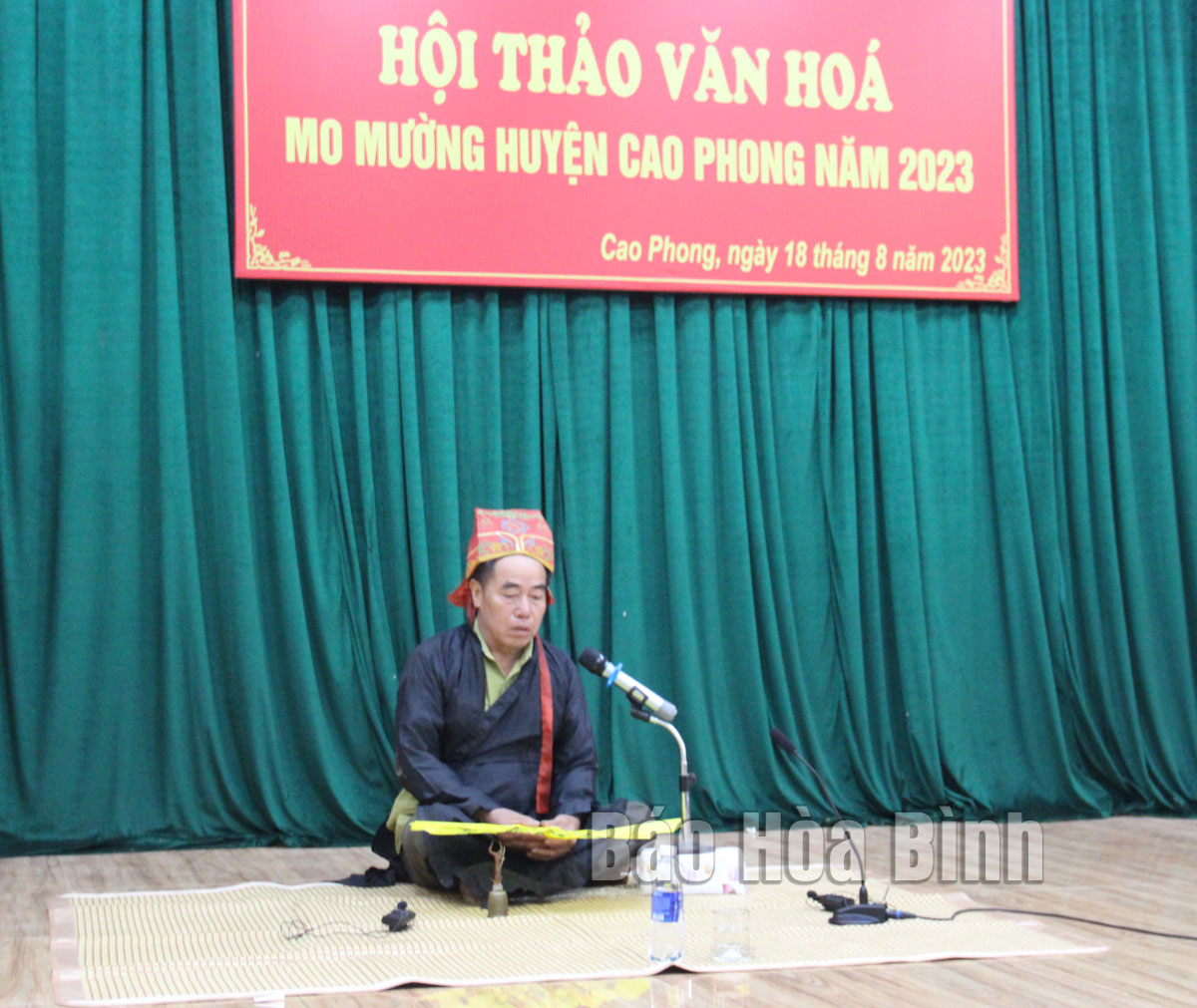
(HBO) – The People’s Committee of Cao Phong district on August 18 organised a workshop on Mo Muong, unique cultural heritage of the Muong ethnic group in Hoa Binh province. The event brought together representatives from the People’s Committee and 50 artisans from three Mo Muong clubs in Cao Phong, Tan Lac, and Lac Son districts.

Bui Van Dong, a Mo practitioner in Thach Yen commune, Cao Phong district, performs Mo Muong at the workshop.
Mo Muong is a job and also a performance practiced at funerals, religious
festivals, and life cycle rituals by the Muong ethnic group. The art consists
of Mo prayers and performances, by Mo practitioners, or Mo artisans.
Cao Phong is home to 37 Mo artisans, and eight learners and assistants, all of
them members the Mo Muong Thang Club.
Currently, most of the Mo artisans are old, thus hindering their efforts in
teaching and preserving the art. Therefore, the workshop was intended to seek ways to preserve and promote
intangible cultural heritage values of Mo Muong in the new situation.
Participants also looked into how to raise the sense of responsibility among
the artisans for the research, popularisation and practice of Mo Muong.
They shared the view that Mo Muong Thanh in particular and Mo clubs in general
should offer regular training to young Mo practitioners, and organise
activities encouraging people to join preservation efforts. They also proposed
all-level authorities issue more specific policies in support of the
preservation and promotion of the unique cultural heritage.
With an increasingly vibrant and widespread emulation movement aimed at building cultured residential areas and cultured families, Yen Thuy District has been making steady progress toward improving both the material and spiritual well-being of its people, while fostering a civilized, prosperous, beautiful, and progressive community.
Once lacking recreational spaces and community facilities, Residential Group 2 in Quynh Lam Ward (Hoa Binh City) has recently received attention for the construction of a new, spacious, and fully equipped cultural house. The project followed the model of state support combined with public contributions in both labor and funding.
The "All people unite to build cultural life" movement, which has been effectively integrated with Kim Boi district’s socio-economic development goals, is fostering a lively spirit of emulation across local residential areas, hamlets, villages, public agencies, and enterprises. In addition, through the initiative, traditional cultural values are being preserved and promoted, while community solidarity and mutual support in poverty reduction and economic development are being strengthened.
A working delegation of the Hoa Binh provincial People’s Committee led by its Permanent Vice Chairman Nguyen Van Toan on June 11 inspected the progress of a project to build the Mo Muong Cultural Heritage Conservation Space linked to tourism services in Hop Phong commune, Cao Phong district.
Born and growing in the heroic land of Muong Dong, Dinh Thi Kieu Dung, a resident in Bo town of Kim Boi district, in her childhood was nurtured by the sweet lullabies of her grandmother and mother. These melodies deeply imprinted on her soul, becoming an inseparable part of her love for her ethnic group's culture. For over 20 years, this love for her hometown has driven Dung to research, collect, and pass down the cultural values of the Muong people to future generations.
In the final days of May, the Ethnic Art Troupe of Hoa Binh Province organized performances to serve the people in remote, mountainous, and particularly disadvantaged areas within the province. These were not just ordinary artistic shows, but they were the meaningful journeys aimed at spreading cultural values, enhancing the spiritual life of the people and contributing to the preservation of ethnic minority cultural identities.



